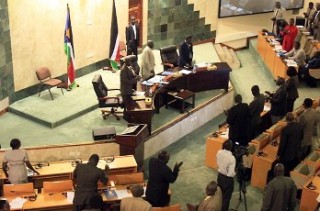S. Sudan security bill continues to generate debate
October 10, 2014 (JUBA) – South Sudan’s security bill, passed on Wednesday amidst protest from some MPs, continues generating debate among supporters and opposers of the law.

The new bill also allows the operatives to monitor frequencies, wireless system, publication, broadcasting station and postal services purportedly aimed at preventing misuses of these facilities by the users.
Peter Adwok Nyaba, a former member of the country’s ruling party (SPLM) who joined the opposition led by former vice president, Riek Machar, said the government was “digging its grave” by forcing legislators to pass the repressive security bill.
“The regime is digging its grave and should be allowed to do so. It generated and continues to generate contradictions until it will devour its head after finishing the tail. The result of not learning or of unlearning is committing the same mistake many times”, he told Sudan Tribune.
Ayii Ayii Akol, the opposition’s deputy head of humanitarian affairs committee said the government’s behaviour “is self-justification of dictatorial tendencies with which Salva Kiir and small cliques of friends and relatives have continued to rule the country”.
“What had happened is a self-justification of dictatorial tendencies and the desire of Salva Kiir with small cliques of friends and relatives around him to continue to impose their rule on our people and the country. And this is exactly what we have been telling the region and the international community, that our people are living under dictatorship,” Akol said on Friday.
He added, “They have been dealing with the government known globally for not just intimidations and killing of its citizens even during times when there was no war in the country, but the government that has the intention to remain in power at any cost”.
Akol cited the disappearance of an engineer from Equatoria in 2011 and the killing of renowned political commentator, Isaiah Abraham in 2012 as likely to occur with the new law in place.
Paul Mayom Akec, a member of the defense, security and public order committee in parliament sought to allay fears about the law, explaining that checks and monitors are provided to ensure operatives do not abuse powers granted to them under the new bill
There are legal systems provided for in the laws for the public to report their concerns, he told reporter on Friday.
Mark Nyipuoc, deputy speaker said it would not be legally justifiable to delay the passing of the bill into law after more than two years of seeking approval from the assembly house.
“A lot of changes have been made. If you have read the new bill, you find a lot of differences. The immunity of the security personnel has been removed. They no longer have the immunity now. There is also a board to look into complaints and if someone is not satisfied with the work of the board, there is another room for appeal to the high court. The powers to arrest have been reduced and divided into two parts,” said Nyipuoc.
“There is part without arrest warrant and a part with arrest warrant. In the first draft, it was without warrant but now it has been made clear”, he added.
OPPOSITION LEADER SLAMS LAW
Lam Akol, the leader of the opposition Sudan People’s Liberation Movement for Democratic Change (SPLM-DC) criticised the manner in which the House passed the country’s new security bill, saying it contravened its conduct of business regulations that allows lawmakers 72 hours to study any resolution tabled for final vote.
SPLM-DC party members walked out of the assembly on Wednesday after the parliamentary speaker refused calls to adjourn the session.
(ST)
